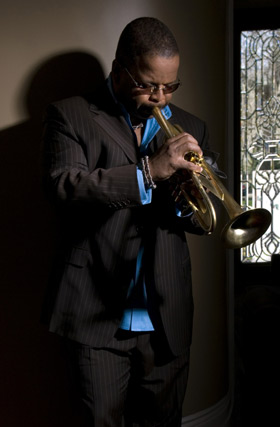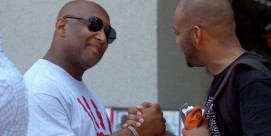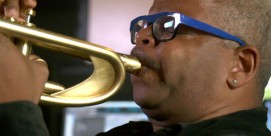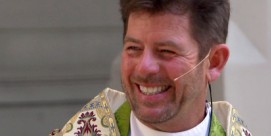Terence Blanchard Extended Interview
Read more of the August 17, 2007 R & E interview with jazz trumpeter Terence Blanchard about his CD, “A Tale of God’s Will: A Requiem for Katrina”:
 In the aftermath of Katrina, when you’re faced with that level of devastation, you know, and you’re frustrated beyond belief, you’re hurt beyond anything you can imagine, I mean it causes you to dig deep and try to find some answers. I mean, you know, because just as humans we always want to know the answers to anything. And after I went through the whole thing of blaming man for his neglect in servicing the levees, and blaming man for their neglect in rescuing and helping people, you know, I had to look at the bigger picture. And I talked to some other friends of mine who are also Christians and believers and, you know, we all just started talking about it, saying, well, there has to be a bigger picture here, there has to be a bigger story. There has to be something for us to learn from this. So when it came time for me to do this album, I wanted to come up with a title that would not give the wrong idea about what had happened in New Orleans. I didn’t want people to think that everything was fine, but I wanted people to start searching for deeper meanings, and “a tale of God’s will” seemed to set the tone for that debate. In making this CD, I want to create debate about the topic. I don’t want people to think that New Orleans is fine and that, you know, we’re moving on to another issue. No, New Orleans is not fine, and the thing about it is, for me, New Orleans is just a symptom of a bigger issue. And, you know, this debate shouldn’t just be about New Orleans. It should be about what’s been going on in our country for a few decades now, in terms of how we’ve been turning a blind eye to a lot of things that are happening right in front of our face. And as citizens, you know, we always wait for someone else to correct things, but I mean I think it’s time for us to take the bull by the horns and make some serious change in this country.
In the aftermath of Katrina, when you’re faced with that level of devastation, you know, and you’re frustrated beyond belief, you’re hurt beyond anything you can imagine, I mean it causes you to dig deep and try to find some answers. I mean, you know, because just as humans we always want to know the answers to anything. And after I went through the whole thing of blaming man for his neglect in servicing the levees, and blaming man for their neglect in rescuing and helping people, you know, I had to look at the bigger picture. And I talked to some other friends of mine who are also Christians and believers and, you know, we all just started talking about it, saying, well, there has to be a bigger picture here, there has to be a bigger story. There has to be something for us to learn from this. So when it came time for me to do this album, I wanted to come up with a title that would not give the wrong idea about what had happened in New Orleans. I didn’t want people to think that everything was fine, but I wanted people to start searching for deeper meanings, and “a tale of God’s will” seemed to set the tone for that debate. In making this CD, I want to create debate about the topic. I don’t want people to think that New Orleans is fine and that, you know, we’re moving on to another issue. No, New Orleans is not fine, and the thing about it is, for me, New Orleans is just a symptom of a bigger issue. And, you know, this debate shouldn’t just be about New Orleans. It should be about what’s been going on in our country for a few decades now, in terms of how we’ve been turning a blind eye to a lot of things that are happening right in front of our face. And as citizens, you know, we always wait for someone else to correct things, but I mean I think it’s time for us to take the bull by the horns and make some serious change in this country.
I know a lot of people who are saying how could something so terrible be God’s will? Well, I think if you’re a Christian or if you’re a believer of any faith or sect, you would have to think, you know–in the Christian faith, you know, we have a saying: God acts in strange ways. You know, so for me, I think this is a way for God to get our attention, basically. You know, we haven’t been paying attention to a lot of things and we’ve been letting a lot of things slide. So maybe this is a way for us to kind of stop and take a hard look at what we’re doing as a community.
A lot of people have been talking to me and they’ve been saying the music has a lot of deep spiritual roots, and it does. I mean I grew up in a church, you know, I played in church every Sunday [at] Central Congregational Church [in New Orleans]. As a matter of fact, Andrew Young was a member of the church, and there were a lot of other local dignitaries who were part of that church. It is an amazing church. And growing up in that church, you know, my father used to tell me all the time, he says “I don’t care what time you get in from your gig, playing a gig Saturday night, you’ve got to get up and go to church and play on Sunday morning.” And so that was a big part of my upbringing, you know, and that music has never–it’s always been a part of me, always. This album gave me a chance to kind of dig deep in that direction, you know. It gave me a chance to kind of not shy away from those issues but deal with them directly and just express how I feel based on my beliefs.
What the entire event of Katrina has done for me, it’s made me realize that, you know, the country, it’s not a collection of sound bites we see on the news. The country is not the articles or interview that we read and see in the periodicals. It’s really the everyday people, you know, because when I saw the large numbers of people who were struggling to survive in New Orleans in the aftermath of the hurricane that broke my heart. Then it also broke my heart to see how vast numbers of Americans came together to support and try to help people in need, and that goes to the core of what I believe about human compassion. And it frustrated me to see people politicize that, and it still does. I get very angry at that because you are attacking the very core of what a lot of people live their lives by, and you’re trying to manipulate that for personal gain. I think that’s the true travesty in all of this, and I think that’s what I’ve woken up to with this event. Because you have the war prior to this and a lot of other things that were going on, but when you see people who were not in the military, people who didn’t have a vested interest in Iraq or the oil business suffering, trying to survive, stuck on roofs, dealing with extreme heat, dealing with dehydration, and they weren’t being cared for for 4 or 5 days? You know, that speaks to such a level of arrogance, you know, and—well, arrogance is the only word I can think of right now, because those very people who were in charge of that are the very people who will say “In God We Trust.” And, you know, the thing that I keep thinking about is how can a person like that use that phrase, on the one hand, and then look at themselves in the mirror, on the other hand. You know, for me it wasn’t about politics. It wasn’t about jurisdiction. It wasn’t about who’s going to take credit for the rescue. It was simply about saving lives, and I think a lot of people dropped the ball and exposed themselves for who they really are.
The interesting thing about making this CD, the irony of it is that, you know, we went to Seattle to do it, and Seattle has a beautiful church there that they actually use for a lot of their orchestral recordings. So while we were in this church recording this music, I kept thinking to myself, I was saying wow, what a fitting place to be doing this particular project, you know, given its title. Plus the people there, the orchestra, they were amazing, very lovely people who are also very committed to this project. I think a lot of people you know, that worked on this project, when they found out what it was about and they found out what we were trying to say, everybody was really eager to do 110 percent to make it come together.
I still have this reverence for the church. When I walk into any religious building or church, I still remember that feeling I had when I was a kid. It’s like, you know, there’s no place to hide. You’re there alone with your soul and your God, and you have to honor that and you have to be respectful of that. And I think, you know, in making this music and recording the music, you know, recording it in a church, the thing I kept thinking about was, you know, I have to let my feelings go, I have to be honest. I’m not making an album for a certain demographic, you know what I mean? This is a project about human tragedy and the endurance of the human spirit, and I have to be true to that.
When we were listening to the playbacks, the thing that I kept thinking about with this music is that not only is it hopeful music but it embodies a number of other emotions: hopelessness, helplessness, anger, and frustration. You know, the piece itself, “Levees”–it’s all about how, you know, there was water everywhere. You know, during [Hurricane] Betsy, I was a little kid when Betsy hit, and I was living in the Lower Ninth Ward at the time, and I remember being picked up from my porch and put in a boat, and looking around and seeing nothing but water, and the water was only maybe about 2 or 3 feet high but it was still a devastating thing for kids. So I kept thinking, if I was affected like that in Betsy, what’s going on with these kids and these people who were on the tops of roofs with 12 feet of water all around them? So “Levees” is all about that. The strings represent the water that’s just everywhere, and the trumpet represents the cries for help that just went unheard.
I had one friend tell me a story, he was rescued off a house in the middle of the night by some rescuers in a boat, and he told me, he said man, the rescuers said when we get to this section we need you to keep the kids quiet, and they cut off the engines and they let the boat drift, they said, because we can’t have the other people know that we’re here because they’re going to start crying for help, and we have to wait to come back to get them. They got to another section and the rescuers said we need you to cover the kids’ eyes because there are dead bodies all over this area. That’s in the city of New Orleans. It’s not in a war zone; it’s in downtown New Orleans that that happened. I’m still not satisfied, because I want to know what really happened. Who’s responsible? Don’t just give me a report. There’s somebody who’s responsible for not making the decision to really service the levees and maintain those levees the way they should’ve been maintained.
My uncle, the Reverend Andrew Douglas, he’s been a great inspiration for me for a long time. I mean he’s come into my aunt’s life; this is her second marriage. But having him around, it’s one of those things, it’s one of those sources of inspiration where you look and you see evidence of a strong African American male who’s not a basketball player, who’s not a pop star, who’s not a big political leader but who’s a person of conviction, you know, and a person of high integrity. I look at him as an example of what the everyday person can aspire to be, you know, so he’s been a great influence on my life in that regard, and he’s been great for my mom since my dad has passed, because my mom and her sister, my aunt, they’re very close. Before the hurricane, you know, I tried to get them to leave the city early. They wouldn’t leave. They left a little late, and then they got stuck in Mississippi, and I couldn’t find them for a little bit, but the three of them were together, that was the most important thing. They were sleeping on the floor of a church in Jackson, Mississippi. I was worried about it, but for them it was like an adventure, you know. They were laughing, saying it was very funny to watch each one of them get up off that floor each morning and to see who would struggle the most trying to get themselves upright. And then after the hurricane, my wife and myself, we owned a small house that my wife used to use as an office. We cleared it out and my uncle, my aunt and my mom, they stayed in that house for a little over a year while his house was being repaired, and now they’re over at his property.
When I think about my uncle I think about his devotion to his flock. I mean, the first thing he wanted to do was to get back into the city. The church had put together a trailer for him that was across the street from the church, so they stayed there for a little bit prior to moving into the house. But it’s been probably one of the most untold stories of this whole saga, about how faith-based groups have been coming to New Orleans and repairing homes, lifting spirits, working with people, worshipping with people, you know. I’ve seen groups out in the Lower Ninth Ward just out there praying. Again, it goes back to my whole issue in this country right now with where does the truth really lie? When you see people who are doing things from the bottom of their hearts, it’s not really reported the way it should be, because to me there are a lot of people around this country who believe and live their lives in the exact same manner, but people of similar beliefs, they’re not brought together in a way that some of these issues are brought together, as I should say, in the media’s eye.
A lot of people have been asking me how have I written pretty music for something that was so ugly, and the thing that I’ve been telling them is that for me it goes back to the documentary [“When the Levees Broke” by Spike Lee]. That’s where it starts. Well, let me back up. Even before then, when we went to my mom’s house, and after all of the cameras had left and everybody was gone, I stood in front of my mother’s house, and it was amazing, because the only thing I heard was silence. I mean, and it was very bizarre. I didn’t hear any insects, no birds, no dogs barking, nobody cutting the grass, no cars moving, nobody moving around. Nothing. Only air. Only the wind. And people were asking me immediately in all of my interviews, you know, are you going to write music, you know, based on the hurricane? And I kept telling them, I said man, this thing is so vast it’s hard to kind of assimilate anything, and I don’t hear anything right now. So when I was hired to do the music for the documentary, I was a little nervous, to be honest, because how do you write something, how do you write music for something that’s so tragic, so horrible, and still have the music service the story? Well, when Spike put together the first two hours of the documentary, the first thing I realized was it’s all about the story. You know, when you listen to those interviews, when you listen to those who were actually in the aftermath of the hurricane tell their stories of survival and struggle, the first thing that I thought was the music doesn’t need to be traditionally New Orleans music. It doesn’t need to be angry music because their anger is very prevalent in their stories. The music just needs to be the glue to kind of bring all these elements together and not get in the way of any of those stories. So that was my thought process in terms of creating the score for “Levees.” And then I just took those themes and just expanded the arrangements for those with band and orchestra.
I grew up in a church and I grew up with an interesting spiritual background, because my father went to a traditionally Congregationalist church and my mother was Baptist. So their thing was, you know, when the kid is born the gender is going to decide, you know, which church the kid would go to. So I started going to church with my father, but I would also go to church with my mom on occasion, so I got a chance to hear a lot of different styles of spiritual music, because at my father’s church they sing a lot of classically based spiritual music. In my mom’s church it was mostly gospel, and that music had a heavy effect on me. I mean, it had a profound effect on me, because at the core of that music is honesty, you know. It’s truth. You can sit down and you can break it down into its technical elements, chord progressions and all that stuff, but it’s really about the intent of what that music is trying to say. And that’s what stuck with me, you know, and that’s what I still have, and when it came time to record the music for this album that’s what I drew upon. You know, so it’s interesting that people make that correlation about spiritually based music hearing it in this album, because it’s not something I’d intentionally tried to do, but it’s always been a source of inspiration, you know, in my playing, and apparently it must be coming through in some of the things people are listening to.
What I hope for in New Orleans is the same thing I hope for for the country, really. I mean I really hope that, you know, as a society we really just ought to become more active, and I’m seeing it in New Orleans. The beautiful thing about being in New Orleans right now is that despite all of the lack of support, you know, from the federal government there are a lot of people who are moving home and a lot of people doing it on their own. And granted we still have a very, very long way to go. There’s decades of work to be done to rebuild the city. But it’s really beautiful to see that pioneering spirit that we’ve always equated with being truly American. You see it in New Orleans right now because there are people who are coming back. They don’t know what’s going to happen with the city. We hear all types of stories all the time, good and bad, you know, but despite all of that, you know, there’s’ a pioneering spirit amongst the people who are there, you know, and they are fighting tooth and nail to bring their communities back.







